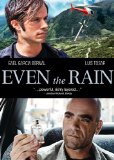| Reviews & Columns |
|
Reviews DVD TV on DVD Blu-ray 4K UHD International DVDs In Theaters Reviews by Studio Video Games Features Collector Series DVDs Easter Egg Database Interviews DVD Talk Radio Feature Articles Columns Anime Talk DVD Savant Horror DVDs The M.O.D. Squad Art House HD Talk Silent DVD
|
DVD Talk Forum |
|
|
| Resources |
|
DVD Price Search Customer Service #'s RCE Info Links |
|
Columns
|
|
|
Even the Rain
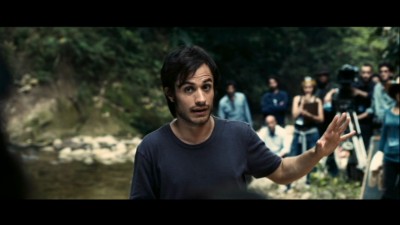
How can a filmmaker do justice to history, particularly a history that carries a payload of deeply troubling exploitation? That's a question that reverberates through Even the Rain, a film by Spanish director Icíar Bollaín (also an actress who appeared in Ken Loach's Land and Freedom, working here from a script by longtime Loach collaborator Paul Laverty). It delves far into the past, presenting a Howard Zinn-inspired reminder of New World colonization at the hands of European Christian imperialists, whose devastation to the native ("Indian") American population remains an uncomfortable, indelible part of the American legacy. It does so through the lens of a parallel contemporary crisis, with the long-suffering, poor, marginalized native people of Bolivia fighting for a substance as basic to life as their water, which is at the center of a privatization scheme for which the downtrodden "Indians" will, as usual, pay the heaviest, most painful price so that already-affluent people elsewhere can do even better. It wraps all of this together by telling it through the making of a film by well-intentioned Spanish crew who, in bringing their production to Bolivia for both "authenticity" and cheap labor, mean to confront the world with the troubling story of the natives' long-ago exploitation, but whose intrusive presence as the natives continue to struggle against oppression may be more a part of the problem than any aid to their plight. The filmmakers who made Even the Rain, like the filmmakers they're depicting, may have bitten off a bit more than they're capable of chewing, but the results are at the very least interesting, provocative, and occasionally challenging and powerful.
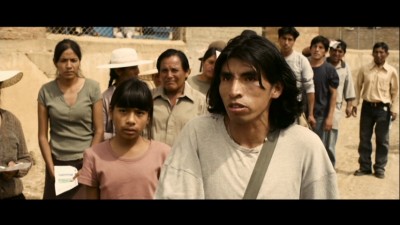
Redoubtable Mexican actor/international superstar Gael Garcia Bernal ( Y Tu Mama Tambien, Bad Education, The Science of Sleep, etc., etc. -- he has a long, transcontinental history of taking risky/juicy parts) is Sebastian, a director/Artist of Cinema from Spain who has for long, patient years been developing a film about the violent arrival of the Spanish emissary Christopher Columbus to the New World of South America, with its accompanying, appalling cultural and physical violence and material exploitation wrought against the people who were already there. Sebastian is inspired by the guts of Daniel (the Quechua actor Juan Carlos Aduviri) one of the hundreds of indigenous Bolivians who show up to an open casting call, who insists that he and his daughter be auditioned even though most of the would-be extras (most of whom seem to have shown up because of serious unemployment/economic need) will have to be turned away. Sebastian's penny-pinching producer/collaborator, Costa (Lui Tosar, The Limits of Control), warns him against casting Daniel, but the artistically contrary Sebastian, whose motto is "the film always comes first," insists. It turns out that Costa was correct in a way: Daniel is part of a movement of native Bolivians to halt the corporate privatization of their water supply, which would make the very essence of life prohibitively costly to an indigenous population that, like its counterparts all over the two American continents, is disproportionately uneducated, poor, and discriminated against.
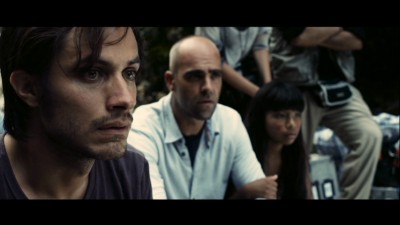
The self-ennobled, artistically temperamental, well-meaning, but hopelessly naïve Sebastian finds himself torn between his convictions when it starts to look like the film, rather than being placed above everything and everyone, may be jeopardized by his star's activism, with Daniel's falling on the wrong side of what appears to be a Bolivian police state that serves the interests of international corporations. The entire production -- with its self-consciously "liberal" actors, proud of their good-deed film and puffed up with their own cosmopolitanism for picking up a few Quechua words during their stay, and the film's drunken, doomsaying Columbus (Karra Elejalde), a wiser, older presence who's been anguished from the beginning by the contradiction in what they, a well-off Spanish production with a low budget, are doing by using Bolivia and its people to make their movie -- begins to feel the possible logistical and ethical unfeasibility of what they're doing, amid the escalating riots and violence between protesters and police, with the resulting disruption to their shoot and even threats to their safety. Costa, arrogantly assuming that Daniel can't understand English, brags over his cellphone to a producer in the UK that the film will save big because the desperate natives will work for $2 a day; Daniel has worked construction in the U.S. and can discern the meaning, however, and Costa is caught up short with his awful hypocrisy and his alienation of their star. When Daniel, despite being bribed by Costa to lay off the politics until after the shoot, is arrested during a protest, his face rendered nearly unrecognizable by a beating at the hands of the riot police, Costa is forced to take a long, hard look at himself, as is Sebastian, whose artistic ideals may not dovetail as comfortably with his political convictions as he had complacently assumed.
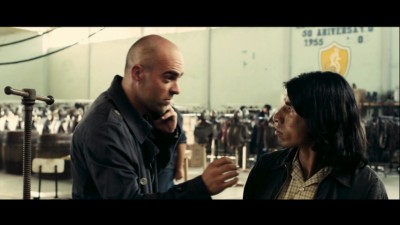
Even the Rain offers a rich, fascinating proposal for bringing history to life through cinema, but the results are mixed. It does reflect, with both passion and responsibility, the actual events of the Bolivian water crisis of 2000, in which international corporations really did conspire to milk profit out of indigenous peoples in subsistence-level economic conditions by astronomically increasing their costs for water, and the people really did stand up and suffered violence at the hands of the state, finally regaining that absolutely vital ground; just for redirecting our attention to one salient episode in globalization's ongoing vying between people's basic well-being and the need for bigger profits, the film has a definite value. But its value as cinema is a bit more dubious: Laverty and Bollaín have put an awful lot onto their film's plate, and some corners are cut in the storytelling, out of the apparent intention of making all the complexity manageable for us, the audience. The result is that the meaning of Sebastian's and Costa's situations, along with the local political turmoil that starts out as background trouble and then consumes their film shoot, is too often spelled out too directly and neatly. For example, Costa experiences a change of heart that we know is plausible and right, but he experiences it hastily, as if it were a piece of the film's puzzle that needed to be efficiently fit in to make it "complete"; it could've been rendered with more depth and had more impact, but instead, it's like the political-film equivalent of a not-entirely-earned happy ending. The film sometimes feels like a smart, conscientious, complex political dialogue whose different viewpoints and ironies have been too specifically assigned to this or that character or contrived situation, leaving us with a story full of promising paradoxes and gray areas that is -- for another irony -- played out with characters and a plot that sometimes feel like illustrations, examples, rather than individuals, and in ways that are a bit too obvious, a bit too black-and-white, despite the intention being the opposite. Despite the thoughtful, radicalized political positions the film rightly makes no bones about having, the filmmaking itself, while more than competent, is very old-fashioned and by-the-book, which doesn't help with the intermittently schematic feel of the narrative. A better-integrated dramatization of the clash between an appalling but important history and an attempt to make it into a movie was done by Atom Egoyan in Ararat; philosophical explorations on the same subject have been put onto the silver screen to great effect in recent years by Godard (who, with his bluntly didactic, non-dramatic approach, makes good use of "characters" who are really symbols). But Even the Rain is unsteady on its feet, vacillating between the didactic and the dramatic in a way that makes it not entirely successful as either one or the other.
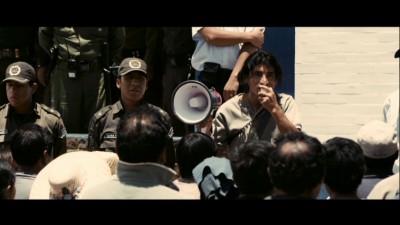
That isn't to say that there aren't moments where it comes together, though, and there are enough of these to make the film worth your consideration, despite its drawbacks. The scene in which Daniel confronts Costa is gratifying on all fronts, the image of Columbus's ship looming in a warehouse/production headquarters says more than a thousand words, and the place the film leaves Sebastian is just right, suitably enigmatic and not overly harsh in its judgment. The interplay between what we're shown of the right-now water crisis and our glimpses of the film that's being made by Sebastian and Costa (as well as its making, with all of its necessary marshaling of the indigenous Bolivians as they reenact the oppression of their ancestors for a new, better-meaning group of curious outsiders) makes for at least one level at which we can see and feel the contradictions and tensions at play, without needing them to be forced by story twists or spelled out in dialogue; these are the best-realized parts of Laverty's and Bollaín's vision, the sequences that most effectively bring us to the intended contemplation of the too-frequent, difficult-to-overcome failure of even our most enlightened, thoughtful, but still peskily abstract convictions to have enough real-world currency to make us something better than naïve or hypocritical. The moral(s) of Even the Rain's story -- that actions speak louder than words, that an awareness of a problematic history is incomplete without a concurrent awareness of its ongoing repercussions and consequences, of our own immediate involvement with our own history -- is right on. If it had adhered to that astute thinking more closely in its actual execution (this is decidedly a traditionally-told story, and the traditional narrative-dramatic-movie rule of "show, don't tell" is the cinematic equivalent of "actions speak louder than words"), Even the Rain could have had some amazing results; as it stands, it doesn't really amaze, but it does intrigue throughout, involve often enough, and affect and inspire to a sufficient extent that its virtues outweigh its flaws in the end.
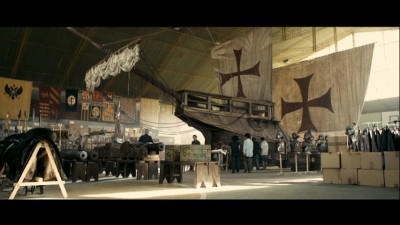
THE DVD:
The 2.35:1 aspect ratio, anamorphic-widescreen transfer of the film offers only fair picture quality overall, with the initially most noticeable flaw being some edge enhancement throughout that becomes particularly noticeable with lines against a backdrop of sky or open/bright space. That may be the result of excessive digital noise reduction (DNR); too much of the film's natural grain/texture seems to have been hastily scrubbed away, resulting in a clear enough (and the colors look good throughout) but too-flattened, sometimes almost videotape-like look. There is also slight aliasing notable at various points.
Sound:The two Dolby Digital soundtracks (both 2.0 and 5.1 are included) are much better-done than the video has been; both are clear, rich, full, and resonant, with the many deep/bass-y undertows in Alberto Iglesia's score coming through particularly well on the 5.1 track, and no distortion, imbalance, or other audio flaws whatsoever discernible at any point.
Extras:Just the film's original theatrical trailer, with its fitting (if somewhat self-aggrandizing) Howard Zinn quote: "The memory of oppressed people cannot be taken away, and for such people revolt is always an inch below the surface."
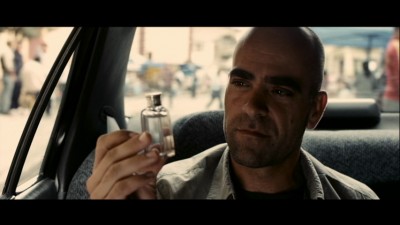
Icíar Bollaín's Even the Rain is an admirable but uneven film, a bit wobbly as it veers back and forth between digging into the rich, geopolitically-conscious contradictions its story offers and schematizing them in a way that's a bit too tidy. The cast is fine: We get the reliably captivating/committed Gael Garcia Bernal as a filmmaker torn between his artistic instincts and the exploitation he's inadvertently engaged in, and the even better Luis Tosar as the mercenary movie producer whose cynical defenses are penetrated by the reality that surrounds them as they attempt to make a film amid an uprising of poor, rightly indignant native people (South American "Indians") in Bolivia. Even the Rain's troubles come from the overly smooth, too-neat contrivance of a couple of its story developments, and a few too many violations of the basic "show, don't tell" rule; some of the discussions and arguments about the privatization of Bolivia's water supply for profit at the expense of the impoverished natives seem too scripted, a little too much of the plot too eager to get from point A (seemingly irresoluble problem/paradox) to point C (redemption) without spending sufficient time at the more challenging, less rushed point B (where we might have been better able to understand the development of conscience within a money-grubber, for example, or where a drunken, bitter cast member's thwarted idealism comes from, etc.) But Even the Rain's blind spots and imperfections don't too badly sap the power its gray areas still hold; there are moments where it's moving and devastatingly thought-provoking, too. Bollaín doesn't have much of a personal style, but neither is the film unskilled, and things move along engagingly and fluidly enough despite the absence of much in the way of hands-on visual creativity. In its weakest moments, Even the Rain is like a pamphlet right-mindedly relaying historical and sociopolitical information that's important, but a film (at least a film like this one) is not a pamphlet, and some of that information is relayed in a way that puts the brakes on the dramatic energy a straightforward drama like this one needs to sustain its momentum. This is not a didactic/dialectical political film like those of Godard, for the best example, but a dramatization of a politically-charged story, and in that context, the informational and philosophical points don't work very well when they're left this undigested, dramatically speaking. At its best, however, the film does successfully bring some neglected histories, both long-ago and very recent, to something like life, in all its ambivalences and paradoxes. In these better stretches, one doesn't just nod one's head in agreement but feels in a more immediate and visceral way the reason this story is has enough tension and life-or-death passion that it needed to be told on film. Enough of the film does successfully shift its gears up to that speed that Even the Rain is more often an involving, vivid illustration than just a tract that's dutifully responsible to its admirable politics, and worth a watch despite its flaws. Recommended.
|
| Popular Reviews |
| Sponsored Links |
|
|
| Sponsored Links |
|
|
| Release List | Reviews | Shop | Newsletter | Forum | DVD Giveaways | Blu-Ray | Advertise |
|
Copyright 2024 DVDTalk.com All Rights Reserved. Legal Info, Privacy Policy, Terms of Use,
Manage Preferences,
Your Privacy Choices | |||||||









